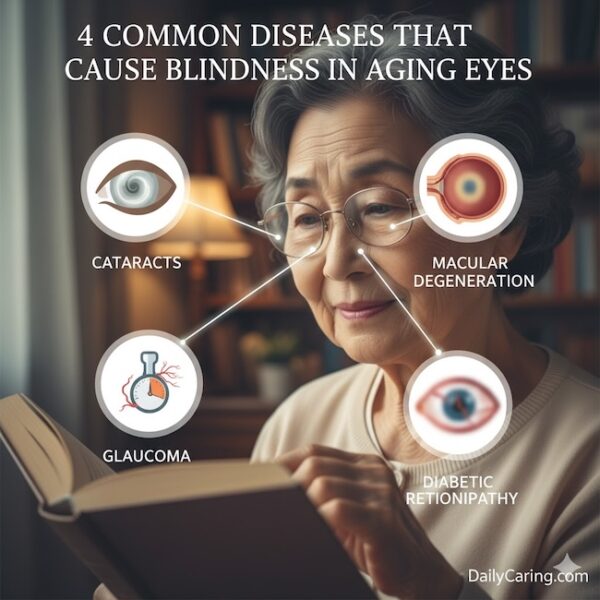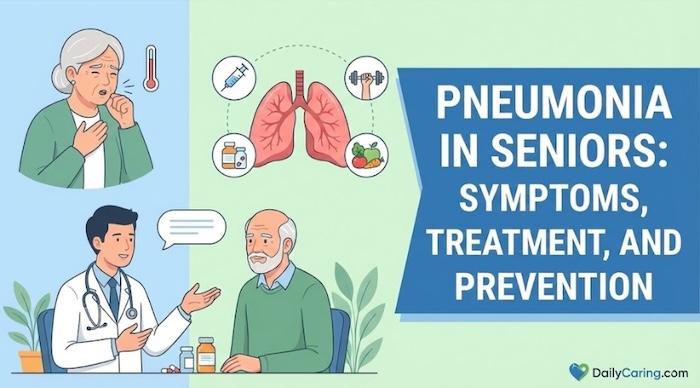For many seniors, vision decline is so gradual it's often mistaken as an inevitable part of aging—until a fall, a medication error, or social withdrawal makes the problem dangerously clear. The early warning signs of conditions like glaucoma, macular degeneration, and cataracts are frequently subtle and easy to miss in the busyness of daily care.
But what if you could spot the small clues before they become life-altering problems? Proactive vision care is a critical, yet often overlooked, pillar of senior health and safety. Learning to recognize these early signals empowers you to take action that can preserve not only their eyesight but also their independence and quality of life.

Vision Problems Can Often Cause Behavioral Changes
Vision problems start slowly and are usually painless. That’s why they can be hard to detect in aging eyes, even for an older adult themselves.
But the earliest signs of vision problems are usually behavioral changes.
If you notice your older adult acting differently, it might be a good time to have their vision and eye health checked by an eye doctor.
For example, you might notice that your older adult avoids reading or is now sitting very close to the TV.
Maybe they’re mixing up medications or canned foods that have similar labels. Or, they might be tripping over things that are right in front of them.
We explain the four most common eye diseases that cause blindness in seniors and show how they affect vision.
Being aware of how your older adult’s vision might be affected helps you identify warning signs and increase the likelihood that early treatment will be effective.
Early Detection and Treatment Can Minimize the Risk of Blindness
Getting regular comprehensive eye exams is the key to keeping aging eyes healthy.
With these four most common eye diseases, early detection and treatment can save vision.
Don’t wait until significant vision loss has already occurred.
If your older adult has any of these signs of vision changes or problems, no matter how small, get them to the eye doctor ASAP.
VIDEO: 4 Diseases that Can Cause Blindness in Aging Adults
4 Signs of Vision Changes to Watch Closely
1. Age-related macular degeneration (AMD)
What is Age-Related Macular Degeneration (AMD)?
- Damage to the part of the retina that lets us see straight ahead.
- Usually causes a slow, painless loss of vision.
- It is the leading cause of vision loss and blindness in Americans aged 65 and older.
Signs of AMD
- Shadowy areas in the center of their vision.
- Not seeing things right in front of them.
- Unusually fuzzy or distorted vision.
AMD Treatment
- Treatments may improve vision or delay the progressive loss of central vision.
- There isn’t a complete cure for AMD.
2. Cataracts
What are cataracts?
- Causes vision to become cloudy or hazy.
- Often starts gradually and, at first, causes barely noticeable changes in vision.
- The most common cause of vision loss in people over age 40.
Signs of cataracts
- Having a harder time seeing the clock or reading.
- Blurry vision.
Treatments for cataracts
- Early stage: Stronger glasses, magnifiers, or better lighting.
- Later stages: Simple, quick, and almost painless surgery.
3. Diabetic eye disease (diabetic retinopathy)
What is diabetic retinopathy?
- A complication of diabetes.
- Caused by changes in the blood vessels of the retina.
- At first, it’s not noticeable, but over time, it can worsen and cause vision loss, usually in both eyes.
Signs of Diabetic Retinopathy
- Not seeing things that should be obvious in front of them.
- The longer someone has diabetes, the more likely they will get diabetic retinopathy.
Treatments
- It depends on the stage of diabetic retinopathy.
- It’s best to identify and treat this early.
- If some vision loss has already happened, it can’t always be recovered.
4. Glaucoma
What is glaucoma?
- A group of eye disorders that damage the optic nerve. This nerve carries information from your eye to your brain.
- Most types cause no pain and have no symptoms until significant vision loss occurs.
Signs of glaucoma
- Not being able to see things in their peripheral vision.
- A routine eye exam detects glaucoma early by measuring the pressure inside your eye.
Glaucoma treatments
- Medicated eye drops keep eye pressure low.
- It’s essential to use the prescribed eye drops; failure to do so can lead to blindness. Yikes!
Final Thoughts About Vision Loss in Aging Adults
Your observant eye is your loved one's first line of defense against preventable vision loss. By paying attention to the subtle changes in how they navigate the world, you are doing more than just protecting their eyesight—you are safeguarding their confidence, their connection to others, and their ability to live independently. Make a comprehensive eye exam a non-negotiable part of their annual health routine, and don't dismiss small changes as “just getting older.” Your vigilance today can literally shape the world they see tomorrow.
Next Steps: Find government programs that provide financial aid for eye exams and treatment for vision problems
Recommended for you:
- Affordable Eye Exams for Seniors Prevent Major Vision Loss
- 9 Entertaining Activities for Low Vision Seniors with Alzheimer’s or Dementia
- Dementia and Eyesight: 3 Common Changes and Behaviors
About the Author

Chris is a seasoned healthcare executive and entrepreneur from the Pacific Northwest. He strongly advocates for older adults and the caregivers who serve them. Chris has personal experience caring for his father, who had dementia. Chris is an avid outdoorsman; if he's not in his office, he can usually be found on a golf course or in a garden out west somewhere.














You seem to have completely forgotten Cicatricial Pemphigoid. Is ut because not many people have it or are you unaware if the disease?
It’s a rare disease, so we weren’t able to include it in this article about the most common eye diseases that affect vision.
Nice article though I can’t say I have not read similar ones before. What makes this attractive is the way it is written -simple and straightforward.
However, I am often confused by the use of words. For example, this phrase – “can’t always be recovered.”
Can you make up your mind whether it can’t be recovered or always recovered?
Thanks Joseph! I’m glad you found this article helpful. When we say that recovering vision that’s lost to diabetic retinopathy isn’t always possible, we mean is that each person’s eye health is different. In some cases, doctors may be able to help the person recover some of the vision that was lost. In other cases, it may not be possible.